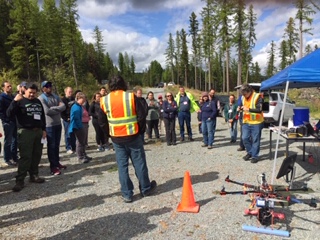WTI Employees Take the Lead in Transportation as TRB Chairs
This January, three WTI researchers will have the honor and responsibility of presiding over committees they chair at the 2023 Transportation Research Board (TRB) Annual Meeting (January 8-12th) in Washington, D.C. TRB is one of seven programs housed in the National Academies of Science, Engineering, and Medicine, and facilitates research, the exchange of ideas, and […]
12th TRB International Conference on Low Volume Roads comes to Kalispell, Montana

Kalispell, Montana proved to be an ideal venue for the 12th TRB International Conference on Low Volume Roads, held in late September. Sponsored by the Transportation Research Board and co-sponsored by the Forest Service, U.S. Department of Agriculture, the conference welcomed 250 participants from 22 countries who experienced low volume roads in northwest Montana firsthand. […]
New Project: Safety Improvements for Low-Volume Roads in Montana
Highway agencies systemically screen the road network to identify those sites that are expected to yield the greatest safety benefits from an investment of available improvement funds. Traditional methods for identifying candidate locations tend to focus on well-travelled roadways that experience higher crash frequencies, despite the fact that many low-volume roads may have high levels […]
International Conference on Low Volume Roads – Registration Now Open!
Plan now to attend the 12th TRB International Conference on Low Volume Roads, being held September 15–18, 2019 in Kalispell, Montana. Register by May 15 to take advantage of the reduced Early Bird rate. WTI is the local host for this conference, so please help spread the word to colleagues in your network. The conference […]
NEW PROJECT: WTI to Create a Guidebook for Transportation Agencies on Unpaved Roads
For roads with very low traffic volumes, some transportation agencies have found that that these roadways can be maintained more economically and at a higher level of service with an unpaved or granular surface, as compared with attempting to maintain an old paved surface. Through this project, WTI will develop a comprehensive information resource on […]
To Pave or Not to Pave?
WTI Research Scientist Laura Fay was interviewed last week by MINNPOST.com on the topic of local road agencies that choose to unpave roads. The discussion focused on Laura’s research sponsored by the Transportation Research Board, in which she surveyed local, state, or federal agencies on how they manage low-volume roads. The survey identified nearly 70 […]
Dates Announced for International Conference on Low Volume Roads
WTI will host the 12th Transportation Research Board (TRB) International Conference on Low Volume Roads on September 15-18, 2019 in Kalispell, Montana. Sponsored by TRB, this conference examines new technologies and new techniques in the planning, design, construction, operation, maintenance, and administration of low-volume roads. Panelists will explore case studies and practical solutions to common […]
